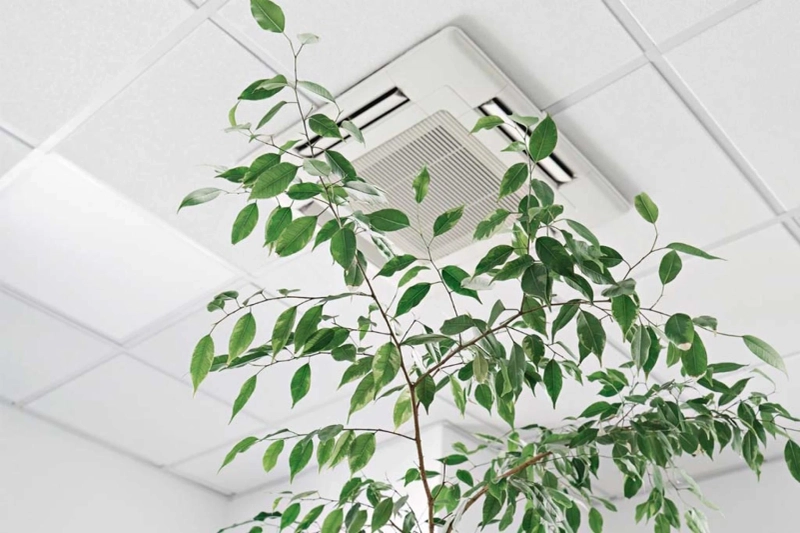During winter, indoor air quality can drop drastically. However, by following these four steps, you can ensure good indoor air quality and enjoy your winter.
4 Steps to Improve IAQ in Winter
1. Keep Humidity in Check
When the humidity level is low, microorganisms such as bacteria and viruses to spread faster. For example, COVID-19 spreads faster in less humid conditions. If you want to keep your space free from these microorganisms and have clean indoor air, you must set the humidity to an optimum level.
Apart from the issues mentioned above, when you have low humidity in your space, you can face various skin-related problems such as dry skin, itchiness, rash, etc. Besides, you can have other problems like sore throat, irritation in the nasal passage, and so on.
So, what is the ideal humidity level for good indoor air quality? It’s advised to keep the humidity level between 45 and 65 percent. At this humidity range, you’ll feel more comfortable and won’t have to deal with the mentioned issues.
To keep the humidity level in check, you can use a humidifier. You can check our previous blog about Ultimate Guide to Air Humidifier to learn more about the humidification system.
Again, if you want to keep the humidity level of your whole house in check, you can use a central humidification system. To know about the benefits of a central humidifier, check 3 Benefits of Central Humidifiers.
N.B: Don’t set the humidity level to more than 65%. Because when the humidity level is higher than 65%, you’ll start to feel sweaty, and molds will start growing and it could cause various respiratory issues and degrade air quality indoors.
2. Use Air Purifiers
HVAC air filters can eliminate dust particles from your space, but it has some limitations. It cannot eliminate viruses and bacteria. Here, air humidifiers come into play.
An Air humidification system is usually installed in the air ducts of your AC unit. It has the capability to eliminate bacteria, mold, viruses, and dust. Besides, if you have an allergy or don’t want pet dander in your space, you must install an air purification system.
Air purifiers are useful for commercial spaces as well. It can remove VOCs from your space and keep the indoor air clean and fresh.
Also, as a homeowner, no one wants their house to smell awful. If you’re currently facing an odor issue in your house, you should install an air purifier.
Several air purification systems are available in the market like ionizing air purification systems, UV air purifiers, carbon activated air purifiers, etc. Before purchasing the air purifier, contact your local HVAC professional to know whether a particular air purification unit will be compatible with your HVAC unit.
3. Ensure Proper Ventilation
Before jumping into ventilation, you must know the basic difference between air circulation and ventilation. Air circulation means the movement of airflow inside your house. On the other hand, ventilation means adding outside fresh air to your space.
Generally, it would be suggested to keep all the windows and doors open. But during those chilly winter days, it’s impossible to do so. Here, you can install a heat recovery ventilation system.
With a Heat Recovery Ventilation or HRV system, you can increase the amount of fresh air in your space. Besides, you can get rid of various airborne toxins and particles. Also, when you install HRV, it’ll help you lower your electric bills and reduce your monthly expenses.
4. Install HEPA Air Filter
If you want hospital-grade safety in your house, you should install a HEPA air filter in your HVAC unit. HEPA air filters can catch particles as tiny as 0.01 microns. Besides, in catching these tiny particles, this type of air filter has an effectiveness of 99.97%. Because of these features, HEPA air filters are used in sensitive areas like hospitals and labs.
While installing the HEPA air filter, you should hire a professional HVAC expert and install it properly. If the air filter isn’t installed correctly, it may block the airflow and do more harm than good.
Original Source: Green Leaf Air


